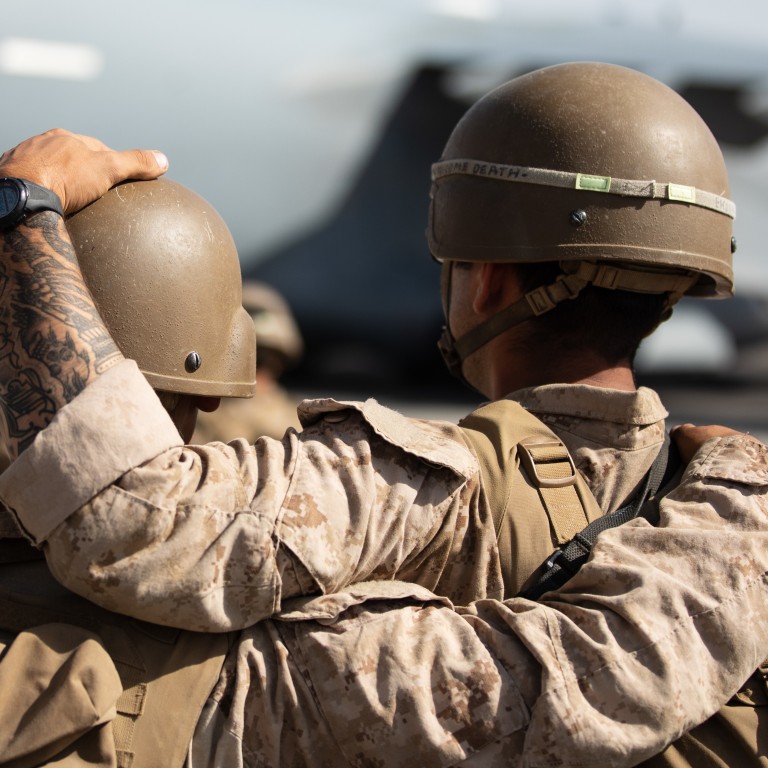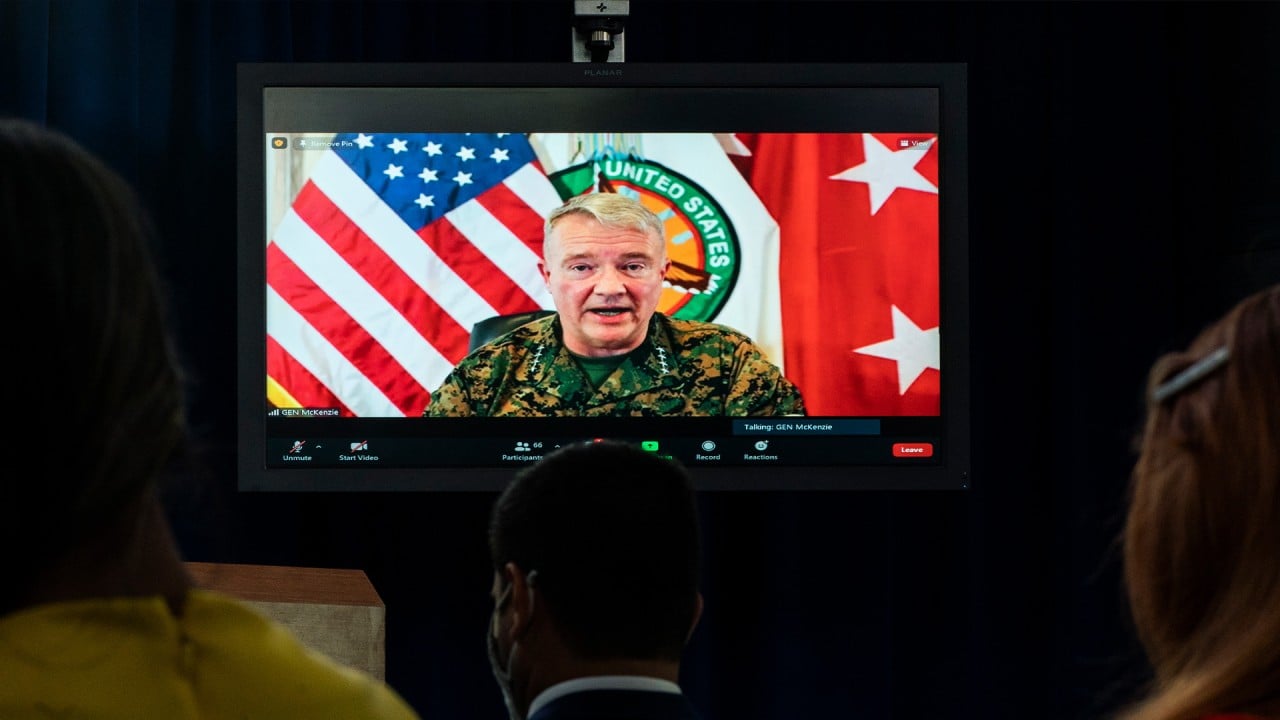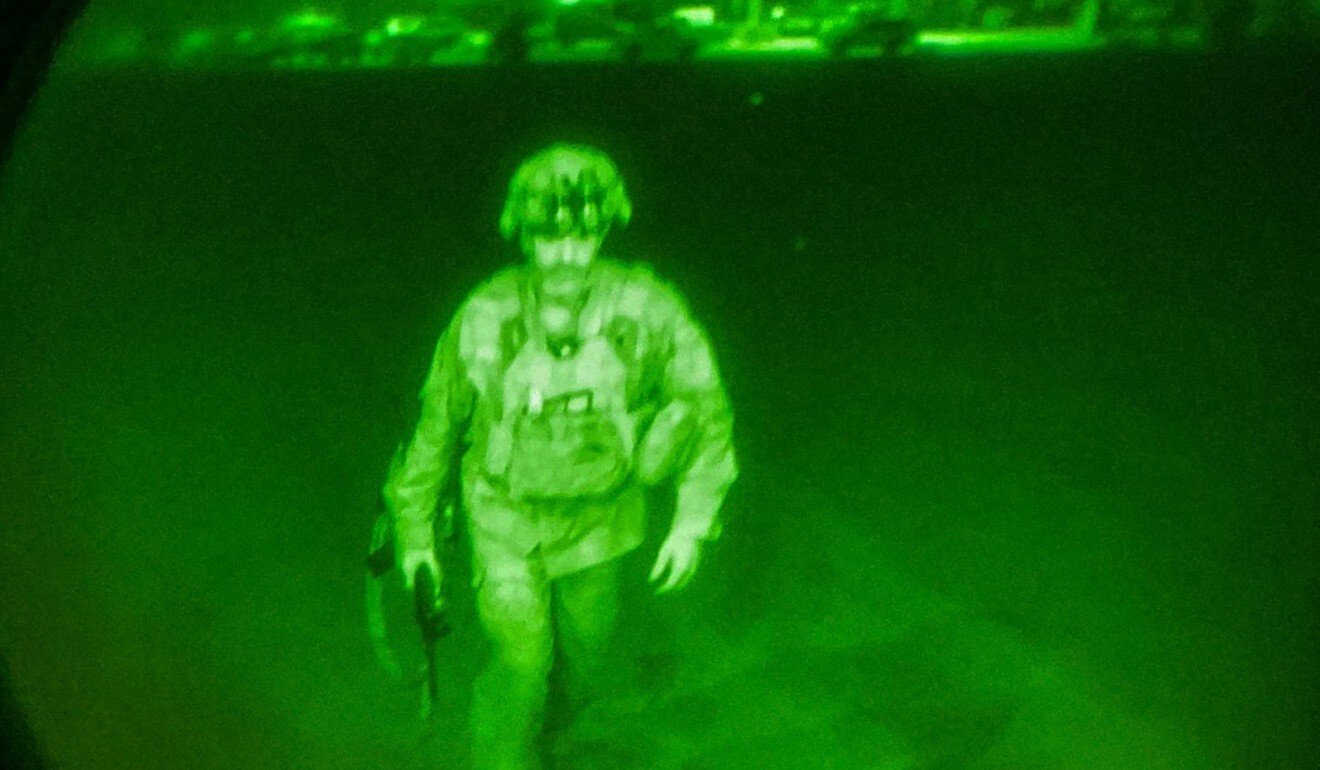
Afghanistan: Last US troops leave Kabul in airlift, ending chaotic withdrawal and 20 years in country
- Last military flight includes troops who had been helping with evacuations, as well as Ross Wilson, the chief US envoy to Kabul
- More than 122,000 people have been flown out since August 14, the day before the Taliban regained control of the country
The United States completed the withdrawal of its military from Afghanistan shortly after midnight Kabul time, Pentagon officials said on Monday, bringing to an end a 20-year mission sparked by the terrorist attacks on the US on September 11, 2001.
Marine General Frank McKenzie, the head of the US Central Command, said in a Pentagon news briefing that the last troops sent to evacuate Americans and Afghans at risk following the Taliban‘s return to power flew from Hamid Karzai International airport on a C-17 transport plane. Ross Wilson, the chief US envoy to Afghanistan, was also on the flight.
Taliban celebrates victory as last US troops leave
“It’s a mission that brought Osama bin Laden to a just end, along with many of his al-Qaeda co-conspirators, and it was not a cheap mission,” McKenzie said. “The cost was 2,461 US service members and civilians killed and more than 20,000 who were injured.”

01:12
Final evacuation flight leaves Kabul, ending 20 years of US presence in Afghanistan
“President Biden is pursing his ‘foreign policy for the middle class’ as a foreign policy that is only directly focused on America’s interests,” said Jon Lieber, Eurasia Group’s US practice managing director.
Biden was willing “to buck the wisdom of the foreign policy establishment who sees an advantage in the US being able to project power by establishing military bases around the globe to ensure stability and, in the case of Afghanistan, protect the rights of women and other groups”, Lieber said. “That is not a legitimate use of power, according to President Biden.”
China, our ‘great neighbour’, will help Afghanistan forge peace: Taliban
Shortly before Monday’s announcement that the withdrawal had been completed, Pentagon and White House officials said that about 122,000 people had been evacuated, approximately 5,400 of them Americans. Questions remained, though, about whether some who might have qualified to take part in the airlift were left on the ground.
McKenzie said the number of Americans who were in Afghanistan and still want to leave could be numbered in the “very low hundreds”.

“The terror threat is going to be very high, and I don’t want to minimise that, but I think what we’ll do is we will work with the Taliban and work with the next government of Afghanistan, whatever its characterisation is going to be, in order to ensure that our citizens are protected and that they have an opportunity to leave,” McKenzie said.
“We still have a variety of significant leverage over whatever future government exists in Kabul, and I have no doubt that the Department of State will fully exercise that leverage,” he added.
“I have asked the secretary of state to lead the continued coordination with our international partners to ensure safe passage for any Americans, Afghan partners and foreign nationals who want to leave Afghanistan,” he said.
“This will include work to build on the UN Security Council resolution passed this afternoon that sent the clear message of what the international community expects the Taliban to deliver on moving forward, notably freedom of travel.”
That resolution, put forward by the US, Britain and France obliges the Taliban to live up to a commitment to allow safe passage for Afghans and foreign nationals who want to leave the country, Washington’s UN ambassador Linda Thomas-Greenfield told reporters.
The Security Council action also requires the Taliban to give “full, safe, and unhindered access” to organisations trying to provide humanitarian aid to Afghans going forward, and to safeguard the rights of women and girls in the country.
While agreeing that Washington botched its withdrawal and that the rights of Afghan citizens are now at risk under Taliban rule, analysts downplayed the possibility of severe, long-term damage to Biden’s standing.
Who is the Taliban supreme leader Hibatullah Akhundzada?
“There is no evidence that Afghanistan’s tragedy will translate into greater global support for China,” said Robert Daly, director of the Kissinger Institute on China and the United States at the Wilson Center, a Washington-based think tank. “While Washington’s handling of the evacuation was disastrous, the crowds attempting to flee the country demonstrate that of American power and modern values brought hope … to many Afghans.
“In cheering against the US, China runs the risk of being closely associated with the Taliban, whose atrocities are likely to increase in coming months,” Daly added. Chinese President Xi Jinping’s “growing restrictions on Chinese commercial and cultural life and the [Chinese Communist Party’s] ongoing suppression of Uygurs and Tibetans make China an unpalatable alternative to American leadership”.
Christopher Miller, a professor at the Fletcher School of Law and Diplomacy at Tufts University, agreed that China’s characterisation of what lies ahead will prompt a reassessment of ties with Washington among its allies.
“I’m pretty sceptical of those who would draw a link between what the Biden administration is doing in Afghanistan and whether it would defend Taiwan in a crisis,” Miller said. “I don’t think I see much evidence that everyone else around the world is sort of readjusting all of their assumptions based on this one decision.”
“The sad reality is probably that the American populace isn’t going to punish Biden for the impact of this decision on Afghanis, which I think is one of the hard realities of international politics. … That they have to suffer under Taliban rule.”
Additional reporting by Jacob Fromer

